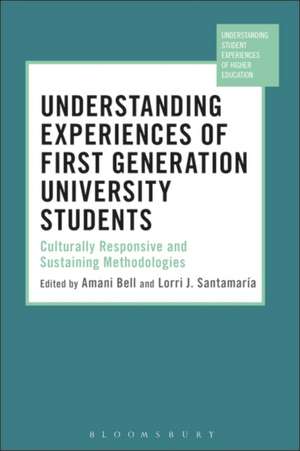Understanding Experiences of First Generation University Students: Culturally Responsive and Sustaining Methodologies: Understanding Student Experiences of Higher Education
Editat de Dr Amani Bell, Dr Lorri J. Santamaríaen Limba Engleză Hardback – 21 feb 2018
| Toate formatele și edițiile | Preț | Express |
|---|---|---|
| Paperback (1) | 224.21 lei 6-8 săpt. | |
| Bloomsbury Publishing – 21 aug 2019 | 224.21 lei 6-8 săpt. | |
| Hardback (1) | 715.26 lei 6-8 săpt. | |
| Bloomsbury Publishing – 21 feb 2018 | 715.26 lei 6-8 săpt. |
Preț: 715.26 lei
Preț vechi: 1028.08 lei
-30% Nou
Puncte Express: 1073
Preț estimativ în valută:
136.87€ • 141.20$ • 114.21£
136.87€ • 141.20$ • 114.21£
Carte tipărită la comandă
Livrare economică 26 martie-09 aprilie
Preluare comenzi: 021 569.72.76
Specificații
ISBN-13: 9781350031845
ISBN-10: 1350031844
Pagini: 240
Ilustrații: 10 bw illus
Dimensiuni: 156 x 234 mm
Greutate: 0.52 kg
Editura: Bloomsbury Publishing
Colecția Bloomsbury Academic
Seria Understanding Student Experiences of Higher Education
Locul publicării:London, United Kingdom
ISBN-10: 1350031844
Pagini: 240
Ilustrații: 10 bw illus
Dimensiuni: 156 x 234 mm
Greutate: 0.52 kg
Editura: Bloomsbury Publishing
Colecția Bloomsbury Academic
Seria Understanding Student Experiences of Higher Education
Locul publicării:London, United Kingdom
Caracteristici
Identifies convergences and divergences in the experiences of culturally, linguistically, and otherwise 'diverse' first generation students in six countries across four continents
Notă biografică
Amani Bell is the Innovative Research Universities Vice-Chancellors' Fellow and an honorary Senior Lecturer at the University of Sydney, Australia. Her research takes a participatory approach to exploring the challenges and opportunities of higher education.Lorri J. Santamaría is an Associate Professor in the Faculty of Education at the University of Auckland, New Zealand. She is an expert in culturally responsive education and the impact of cultural and linguistic diversity on the field of educational leadership.
Cuprins
List of Figures Notes on Contributors Series Editors Foreword Foreword, Arnetha F. Ball with Lorri J. Santamaría1. Introduction: Why Focus on First Generation Students?, Amani Bell and Lorri J. Santamaría 2. Excavating Stories of First Generation Students in Aotearoa New Zealand, 'Ema Wolfgramm-Foliaki and Lorri J. Santamaría 3. Experiences of Indigenous and Non-Indigenous First Generation Students at an AustralianUniversity, Amani Bell and Matthew Benton 4. University Practices That Help Canadian First Generation Student Success, Airini and Sereana Naepi 5. Factors Affecting the Success of First Generation University Students at a South African University, Roisin Kelly-Laubscher, Moragh Paxton, Ziyanda Majombozi and Samukele Mashele 6. Transitions of First Generation Students to Higher Education in the UK, Claire Hamshire, Rachel Forsyth and Catherine Player 7. Considering the Cultural Strengths of Older First Generation University Students: An Australian Perspective, Sarah O'Shea 8. As They See It: First Generation College Students and Photovoice, Rashne R. Jehangir and Veronica Deenanath9. Conclusion: Beyond Listening to First Generation Students Amani Bell and Lorri J. Santamaría Index
Recenzii
Much like the students who populate the pages of this manuscript, the editors and authors of Understanding Experiences of First Generation University Students chart new academic territory with their well-researched and poignantly-rendered cross-cultural examination of the lived experiences of first-generation students. Their explication of narrative forms of data and storytelling gives voice and agency to countless numbers of students who might not otherwise be heard.
This book offers much hope for first generation students, through its deep exploration of strategy and experience that has indeed formulated a culturally responsive model to enhance equitable education.
This book offers much hope for first generation students, through its deep exploration of strategy and experience that has indeed formulated a culturally responsive model to enhance equitable education.






